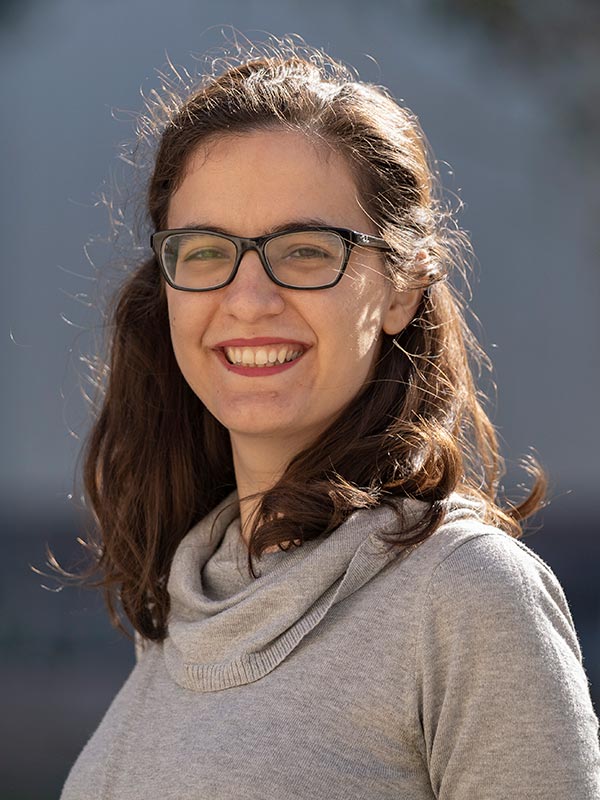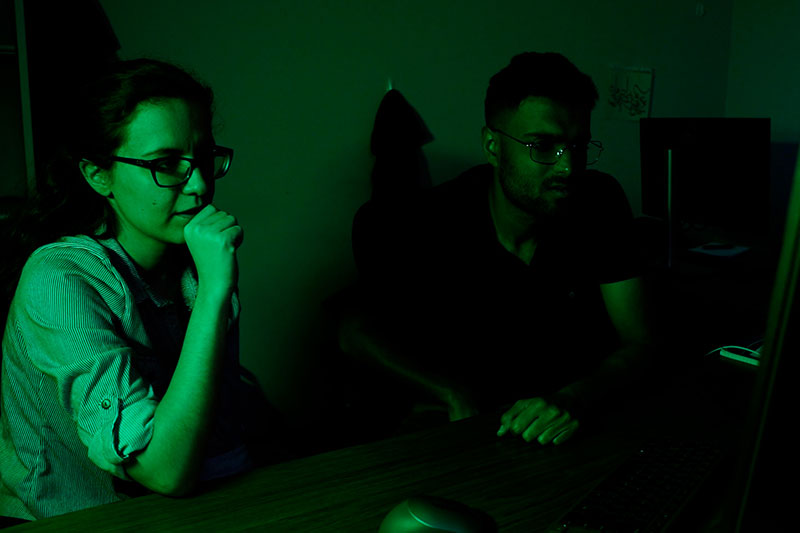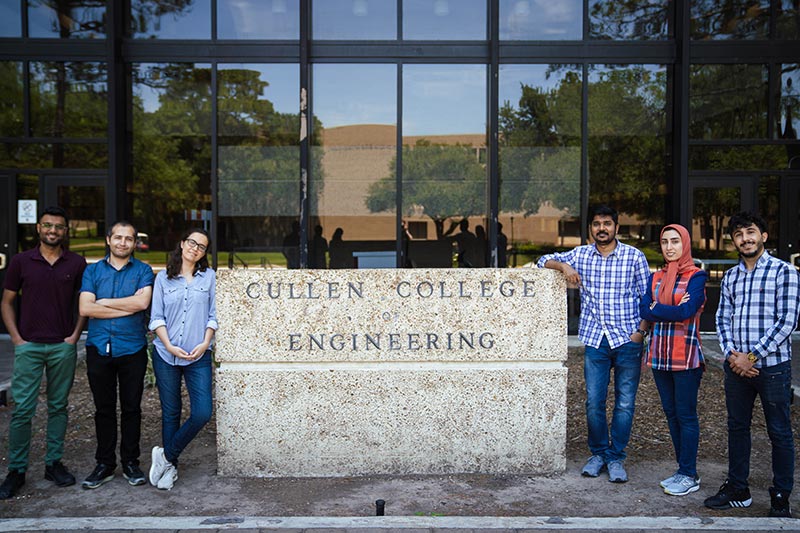
By Stephen Greenwell
 Gül Zerze |
Gül H. Zerze, Assistant Professor in the William A. Brookshire Department of Chemical and Biomolecular Engineering at the Cullen College of Engineering and CPRIT Scholar in Cancer Research, is the first to acknowledge her unusual route to academia, and it starts with boarding school in Turkey, competitive Bridge games, and an advisor that took a chance on her.
Undergraduate Years
“When I was doing my undergraduate, I was not, you know, your standard stellar student at all,” she said. “My high school was a tough, military-style science high school that admits students with a national exam. We had 40 hours per week of all science classes, and then 20 hours per week of enforced self-study. It was military style. Everyone looked the same — Sometimes, when I'm looking at pictures from high school, I can't immediately differentiate who is who.”
The boarding schools in Turkey are government institutions, Zerze said, and while they're free, they have a very rigid curriculum. Because she wasn't allowed to take art classes or music — creative outlets — she gravitated toward playing Bridge after graduation, and took to it naturally.
“I was nominated for national teams of Turkey three times,” she said. “Being nominated for national teams required training. I was playing bridge 16 hours a day, I wasn't going to any of my college classes. I was just barely getting through the exams. I haven't failed any of my classes because of the high school education that I had, I was able to pass, but barely pass. So I wasn't your stellar student at all. But then life goals change.”
However, Zerze realized that she didn't want to stay as a professional Bridge player, and refocused on her studies. She was able to graduate with a 3.16 GPA out of 4.0 — OK, but it limited her options when it came to planning her doctorate.
Ph.D. Years
 |
 Gül Zerze and her graduate students conducting research in the lab. |
“That GPA is not getting you to most of the graduate schools in the U.S., to be honest,” she said. “But my eventual Ph.D. advisor noticed the trend that I was having, how my low grades improved and went to 4.0, 4.0, 4.0 as the years went along. He was able to notice the trend and the potential that I have, that no one else did.”
That's how Zerze found herself at Lehigh University in Bethlehem, Pennsylvania, studying with Jeetain Mittal. Since Zerze earned her doctorate in 2017, Mittal has also moved to the area, taking a Professor position in the Artie McFerrin Department of Chemical Engineering at Texas A&M.
“I did my Ph.D. at Lehigh, because it was the only school that admitted me,” she said. “Jeetain was the one who was able to see the potential that I wasn't even aware of probably. He did that thing that no one else did for me. Once you become a stellar person, everyone else will be after you but he did a harder job that changed my life.”
Curiosities in Science and Engineering
Zerze noted that while she had what she considered “traditional chemical engineering” training, with research in a metabolic engineering and industrial biotechnology lab, she first started to get interested in biology during her undergraduate research.
“That's when I noticed how fascinating any living matter is,” she said. “I was working with a whole bunch of microbes. But along the way, as I was working on them, I was noticing how fascinating living organisms in general are.”
I was working with a whole bunch of microbes. But along the way, as I was working on them, I was noticing how fascinating living organisms in general are.Gül Zerze
Zerze continued with her research work in chemical engineering as she finished her master's degree, but she was faced with a decision to make as she explored earning a doctorate degree.
“That's the most important decision every graduate student makes, once in their life, in which discipline you're going to do your Ph.D., because that's probably going to be your life,” she said. “I knew that I was physically exhausted, working in an experimental lab. It was demanding and physically challenging, so I was like, 'Alright, I'm going to do computations from this point on.'
Zerze notes that she considers her change in focus as more a matter of tools changing than interests.
“I'm not doing experiments, but my fascination hasn't changed,” she said. “I'm still very curious about similar subjects, just my tools to study that changed. The tools that I feel more comfortable with are computational and statistical mechanical simulation tools.”
Postdoctoral Years and Job Search
After earning her doctorate at Lehigh, Zerze spent four years at Princeton as a postdoctoral researcher, with her postdoc advisor Pablo G. Debenedetti, Professor of Chemical and Biological Engineering, serving as another substantial influence.
“He is also the Dean for Research, so he represents the university. But most importantly, he let me be me,” she said. “He didn't try to turn me into something, like a polished pebble that everyone is going to acknowledge. He instead listened to me and tried to just get to know me by letting me express not only my take on the scientific projects we tackled but also my feelings on social fronts even if it is sometimes childish or sometimes very emotional. His patient, respectful and supportive attitude eventually transformed a young science enthusiast into a more mature young professional.”
Under Debenedetti, Zerze said she had a lot of freedom to study whatever interested her. While doing this research, she frequently collaborated with Frank Stillinger, a visiting research collaborator and scientist at Princeton following a 41-year career with Bell Laboratories.
As a Ph.D. student, she also collaborated with Nicolas Lux Fawzi, a Professor of Medical Science at Brown University; and Robert B. Best, a Senior Investigator in the Computational Biophysics Section of the Laboratory of Chemical Physics at the National Institutes of Health.
 A student works in Gül Zerze's lab. |
 Zerze's research team takes a break for a group picture outside the Cullen College of Engineering. |
Zerze is candid about her job search, describing it as “brutal,” given the timing. No university hired her in 2019, and few places were hiring in 2020. However, in her third round of applications, she received multiple offers for universities for the Fall 2021 semester.
She picked UH from multiple offers because of her comfort level following an interview with the hiring committee.
“During the interview, I felt so welcome here,” she said. “I instantly knew that I would be a part of this faculty. Quite frankly, in my last round I got multiple offers, but UH was an easy decision. It was the school that I had maximum overlap with in values — the things I care about, and the things my colleagues and the people who recruit me care about. It's never 100 percent overlap, right? But that overlap was maximized at UH.”
Zerze noted that concurrently with accepting the job offer at UH, she was made aware of the Cancer Prevention and Research Institute of Texas (CPRIT) offering grant money to recruit talented professionals to Texas colleges and universities. Zerze was one of 12 grant proposals selected by CPRIT, providing her with $2 million to perform research to innovate computer-aided drug discovery for breast cancer.
Before coming to UH, Zerze said she knew Jeremy Palmer, Ernest J. and Barbara M. Henley Associate Professor, for about five years. She attributed her comfort level with UH to his presence and Jacinta C. Conrad, Frank M. Tiller Professor, who helped get across the shared values of the department. Palmer, Navin Varadarajan, M.D. Anderson Professor, and Richard Willson, Huffington-Woestemeyer Professor, are three co-workers she speaks to regularly about her own research.
She has a similar path to UH as Mehmet Orman, Assistant Professor of Chemical Engineering. She also liked how genuine and personally caring the newly-hired department chairman Triantafillos J. (Lakis) Mountziaris is.
“I felt an immediate personal connection,” she said, of meeting with her colleagues. “I met with probably the entire faculty before coming here and everyone was genuinely welcoming both towards me and my family. It meant everything to me.”
